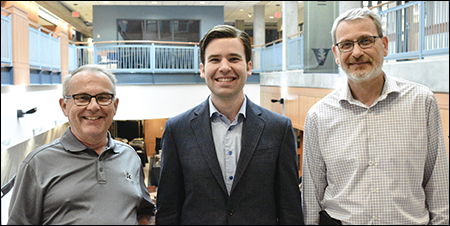A Vanderbilt computer science professor studying sonoluminescence—a process by which light is emitted by small bubbles in liquid when bombarded by blasts of high-pitched sound—has received a competitive research grant from Oak Ridge Associated Universities.
David Hyde, assistant professor of computer science, is one of 35 junior faculty nationwide to win a 2023 ORAU Ralph E. Powe Junior Faculty Enhancement Award, which provides funds to enrich the research and professional growth of young faculty at ORAU member institutions.

The Powe recipients, each of whom is in the first two years of a tenure-track position, will receive $5,000 in seed money for the 2023-2024 academic year to enhance their research during the early stages of their careers. Each recipient’s institution matches the Powe award with an additional $5,000. Winners may use the grants to purchase equipment, continue research, or travel to professional meetings and conferences.
Hyde plans to use the award to develop large-scale computational simulations of sonoluminescence, a phenomenon where sound waves can create highly energetic bursts of light. Over the next year, Hyde plans to collaborate with exascale code developers at Oak Ridge National Laboratory (ORNL) and to visit experimentalists at UCLA.
“Physics simulations and digital twins are powerful tools for scientific investigation. They allow us to explore engineering designs safely and cost-effectively and to better understand the world around us,” Hyde said. “By developing and running simulations with unprecedented resolution and accuracy, we hope to gain deeper insights into the process of sonoluminescence, the underlying physics of which is still not completely known.”
Sonoluminescence has been observed in the wild—for instance, snapping shrimp cause the phenomenon when their claw snaps. Researchers are developing therapeutic applications of sonoluminescence, and the effect also yields insights into the design and behavior of energetic materials.
Hyde and his research group develop computational algorithms, mathematical methods, and deep learning techniques for simulating the natural world, including complex phenomena like explosions and additive manufacturing. Applications of his work range from engineering problems to computer graphics.
In 2022, Hyde was selected as one of five Society for Industrial and Applied Mathematics (SIAM) Science Policy Fellows. The science policy program engages early career professionals in policy and advocacy with the United States Congress and federal agencies.
Hyde earned a B.S. in mathematics with highest honors at age 19 at the University of California, Santa Barbara, where he also was a Regents Scholar. He earned a Ph.D. in computer science, with Distinction in Teaching, from Stanford, where he was a National Defense Science and Engineering Graduate (NDSEG) Fellow and a Gerald J. Lieberman Fellow. Before joining Vanderbilt, he was an assistant adjunct professor in the Department of Mathematics at UCLA.
ORAU, a 153-member consortium of major Ph.D.-granting academic institutions, cultivates collaborative partnerships that enhance national scientific research and education.
Contact: Brenda Ellis
Vanderbilt Engineering Communications